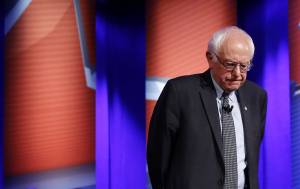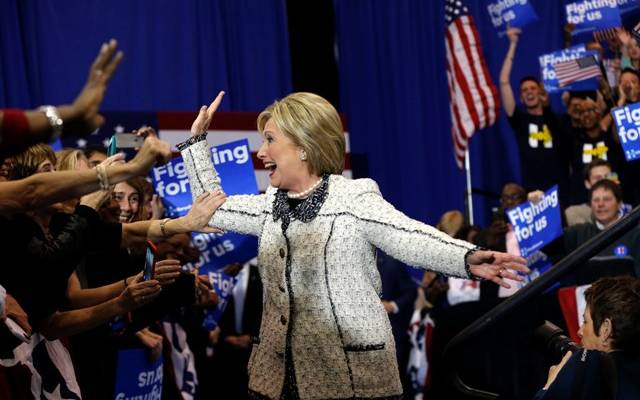Clinton’s victory in South Carolina has brought her one step closer to solidifying her candidacy as the Democratic presidential nominee.
Hillary Clinton overwhelmed Bernie Sanders in the South Carolina primary, drawing staggering support from the state’s black Democrats and putting her in a strong position as the race barrels toward crucial multi-state contests on Tuesday.
Clinton’s lopsided win on Saturday — she led by 48 points — provided an important boost for her campaign and a moment to wipe away bitter memories of her loss to Barack Obama in South Carolina eight years ago. She won the support of nearly 9 in 10 black voters, crucial Democratic backers who abandoned her for Obama in 2008.
During a raucous victory rally, Clinton briefly reveled in her sweeping support from South Carolina voters, hugging backers and posing with them for selfie photos. But then she pivoted quickly to the contests to come.
“Tomorrow this campaign goes national,” she said. “We are not taking anything, and we are not taking anyone, for granted.”
Taken together, 865 Democratic delegates are up for grabs in the March 1 Super Tuesday contests in 11 states and American Samoa.
Clinton’s campaign hopes her strong showing in South Carolina foreshadows similar outcomes in states like Georgia, Alabama, Tennessee and Virginia that vote Tuesday and have large minority populations.
Sanders, expecting defeat in South Carolina on Saturday, left the state even before voting was finished and turned his attention to some of the states that vote in next Tuesday’s delegate-rich contests. In a statement, Sanders vowed to fight on aggressively. He drew 10,000 people to a rally in Austin, a liberal bastion in conservative Texas, the biggest March 1 prize.
“This campaign is just beginning,” he said. “Our grass-roots political revolution is growing state by state, and we won’t stop now.”
Republicans Wage Vicious War
Clinton’s victory came at the end of a day that saw Republican candidates firing insults at each other at rallies in states voting on Super Tuesday. Donald Trump, working to build an insurmountable lead, was campaigning in Arkansas with former rival New Jersey Gov. Chris Christie and calling Florida Sen. Marco Rubio a “light little nothing.” Texas Sen. Ted Cruz was asking parents in Atlanta if they would be pleased if their children spouted profanities like the brash billionaire. And Rubio was mocking Trump as a “con artist” with “the worst spray tan in America.”
Clinton made a stop in Alabama, a Super Tuesday state, on Saturday before returning to Columbia, South Carolina’s capital, for an evening victory party.
Sanders has energized young people and liberals with his impassioned calls for breaking up Wall Street banks and making tuition free at public colleges and universities. But the senator from Vermont, a state where about 1 percent of the population is black, lacks Clinton’s deep ties to the African-American community.

Democratic presidential candidate, Sen. Bernie Sanders. (AP/Patrick Semansky)
Exit polls showed 6 in 10 voters in the South Carolina primary were black, by far the largest proportion in any of the contests so far. About 7 in 10 said they wanted the next president to continue Obama’s policies, and only about 20 percent wanted a more liberal course of action, according to the polls conducted by Edison Research for The Associated Press and television networks.
Clinton’s sweeping victory suggested South Carolina voters had put aside any lingering tensions from her heated 2008 contest with Obama. Former President Bill Clinton made statements during that campaign that were seen by some as questioning the legitimacy of the black presidential contender.
Clinton’s second White House bid lurched to an uneven start, with a narrow victory over Sanders in Iowa and a crushing loss to the senator in New Hampshire. She pulled off a 5-point win over Sanders in last week’s Nevada caucuses, a crucial victory that helped stem Sanders’ momentum.
Clinton will pick up most of South Carolina’s delegates, widening her overall lead in AP‘s count. With 53 delegates at stake, Clinton will receive 39, Sanders at least 14.
Going into South Carolina, Clinton had just a one-delegate edge over Sanders. However, she also has a massive lead among superdelegates, the Democratic Party leaders who can vote for the candidate of their choice at this summer’s national convention, regardless of how their states vote.
Because Democrats apportion delegates proportionally, Sanders is simply hoping to stay close to Clinton in the South. But he’s focusing most of his attention on states in the Midwest and Northeast, including his home state of Vermont.
On the Republican side, voters will cast ballots in 11 states, with 595 delegates at stake on Super Tuesday.
By: AP
